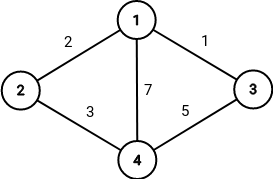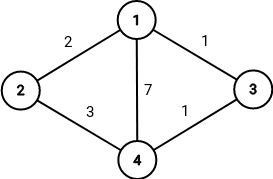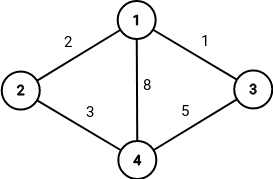CF1163F.Indecisive Taxi Fee
普及/提高-
通过率:0%
AC君温馨提醒
该题目为【codeforces】题库的题目,您提交的代码将被提交至codeforces进行远程评测,并由ACGO抓取测评结果后进行展示。由于远程测评的测评机由其他平台提供,我们无法保证该服务的稳定性,若提交后无反应,请等待一段时间后再进行重试。
题目描述
In the city of Capypaland where Kuro and Shiro resides, there are n towns numbered from 1 to n and there are m bidirectional roads numbered from 1 to m connecting them. The i -th road connects towns ui and vi . Since traveling between the towns is quite difficult, the taxi industry is really popular here. To survive the harsh competition, each taxi company has to find a distinctive trait for their customers.
Kuro is the owner of a taxi company. He has decided to introduce a new fee model for his taxi brand, where the fee for each ride is not calculated based on the trip length, but on the sum of the prices of the roads traveled. The price for each of the m roads has been decided by Kuro himself.
As of now, the price for the road i is wi and hence the fee for a taxi ride traveling through roads e1,e2,…,ek is ∑i=1kwei .
However, Kuro himself is an indecisive person, so he has drafted q plans to change the road price. Each of the plans will be based on the original prices wi , except for a single road tj , the price of which is changed to xj . Note, that the plans are independent of each other.
Shiro is a regular customer of the Kuro's taxi brand since she uses the taxi to travel from town 1 to town n every day. Since she's so a regular customer, Kuro decided to show her all his q plans before publishing them to the public. Now, Shiro wants to know the lowest fee she must pay to travel from the town 1 to the town n for each Kuro's plan.
输入格式
The first line contains three integers n , m and q ( 2≤n≤2⋅105 , 1≤m,q≤2⋅105 ) — the number of towns, the number of roads, and the number of plans that Kuro has drafted respectively.
The i -th of the next m contains three integers ui , vi and wi ( 1≤ui,vi≤n , 1≤wi≤109 , ui=vi ) — two endpoints and the original price of the i -th road.
It is guaranteed, that there is at least one way to travel from town 1 to town n using these m bidirectional roads.
Each of the next q lines contains two integers tj and xj ( 1≤tj≤m,1≤xj≤109 ) — the index of the road Kuro has planned to change and its new price respectively.
输出格式
Print q integers — the lowest fee Shiro must pay to get from town 1 to town n in each of those q plans.
输入输出样例
输入#1
4 5 6 1 2 2 2 4 3 1 4 7 1 3 1 3 4 5 3 4 5 1 3 8 1 4 2 1 3 1
输出#1
4 2 5 6 3 1
输入#2
2 4 4 1 2 2 1 2 3 1 2 4 1 2 5 2 1 3 2 4 3 1 5
输出#2
1 2 2 3
输入#3
2 1 1 1 2 1 1 3
输出#3
3
说明/提示
In the first example, the original overview of Capypaland looks like this, where the number next to each road denotes the original prices of the roads,
 The overview of the first plan,
The overview of the first plan,
 The lowest fee Shiro must pay in this plan is 4 , which corresponds to the path 1→4 .
The lowest fee Shiro must pay in this plan is 4 , which corresponds to the path 1→4 .
The overview of the second plan,
 The lowest fee Shiro must pay in this plan is 2 , which corresponds to the path 1→3→4 .
The lowest fee Shiro must pay in this plan is 2 , which corresponds to the path 1→3→4 .
The overview of the third plan,
 The lowest fee Shiro must pay in this plan is 5 , which corresponds to the path 1→2→4 .
The lowest fee Shiro must pay in this plan is 5 , which corresponds to the path 1→2→4 .